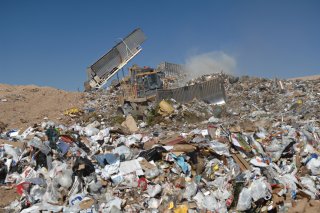Understanding and Control of Municipal Solid Waste Landfill Air Emissions Grants

Across the world, communities generate residential, commercial, and industrial waste that goes to municipal landfills, which generate gas as the waste degrades. About half of landfill gas emissions are methane, which contribute significantly to climate change.
Landfills also emit other gases that can adversely affect human health and the environment. Due to the significant health and climate impacts of these emissions, EPA is committed to developing and identifying better technologies for measuring and mitigating them.
Historically, there has been a limited ability to understand and quantify landfill gas emissions. These include hazardous air pollutants like benzene, odor nuisance compounds like hydrogen sulfide (H2S), and contaminants of emerging concern like per- and poly-fluoroalkyl substances (PFAS). While EPA has developed several landfill emissions estimation tools for public use, lack of quantitative data relating to landfills, how they are managed, and environmental conditions that affect their emissions has limited the accuracy of these tools.
EPA awarded $4.6 million in research grants to quantify and mitigate municipal solid waste landfill emissions.
These projects will help advance methods for monitoring and quantifying landfill emissions of methane and other pollutants, evaluate strategies for reducing these emissions, and improve understanding of how municipal solid waste landfill emissions may change due to future climatic conditions, including extreme weather events. Grantees will use a variety of sensing techniques and modeling approaches to compare current landfill technologies and provide a basis for the future of landfill emission mitigation and management.
To learn more, visit the RFA webpage.
The following institutions are receiving an award:
University of Delaware, Newark, Del.
Project Title: Evaluation and Control of Emissions from Municipal Solid Waste (MSW) Landfills: Direct Measurement and Modeling
Principal Investigator: Paul T. Imhoff
Award Amount: $999,831
Project Summary: Grantees will use stationary, mobile, aerial, and remote sensing technologies to characterize methane emissions at two landfills and evaluate the accuracy of new emissions estimation methodologies. The team will then apply an atmospheric dispersion model, the Weather Research Forecasting (WRF) model, to the data. Researchers will use the WRF to predict emissions for unmeasured periods, evaluate landfill management practices, quantify errors in measurement technologies, and guide technology application. At a significantly lower cost than field testing alone, this project aims to improve uncertainty estimates for methane emissions and enable extrapolation for measuring unmeasured gas emission periods.
View the research abstract from the University of Delaware.
University of Miami, Miami, Fla.
Project Title: Integrating multi-source data for landfill methane emission quantification
Principal Investigator: Jiayu Li
Award Amount: $594,550
Project Summary: The objectives of the proposed project are to 1) develop low-cost air quality sensors to capture spatial and temporal variation in methane; 2) use sensor data from fixed locations, mobile sampling, and drone surveys to map pollution distribution and estimate emission fluxes; and 3) evaluate methane reduction techniques by correlating resolved methane emission data with multiple environmental factors. Researchers will use the data to identify key drivers for landfill methane emissions and lay the basis for evaluating and comparing current landfill technologies.
View the research abstract from the University of Miami.
University of Wisconsin, Madison, Wis.
Project Title: Analysis of Continuous Monitoring Data with Inverse Atmospheric Models to Improve Landfill Gas Emissions Data and Elucidate Drivers of Emissions
Principal Investigator: James J. Schauer
Award Amount: $998,049
Project Summary: The goal of this project is to demonstrate and standardize inverse modeling and spatial mapping methods for quantifying emissions of methane and other health-impacting gases, such as carbon dioxide and hydrogen sulfide. The team will deploy high-sensitivity laser-based sensors to measure methane and other gas emissions at downwind locations of four landfills in the U.S. Drone mapping will be used to identify emission hotspots and the location of fugitive emissions. Researchers will use their low-cost method to provide continuous measurements of landfill emissions at these four landfills and quantify the impact of landfill design and operation on gaseous emissions.
View the research abstract from the University of Wisconsin Madison.
University of Colorado, Boulder, Boulder, Colo.
Project Title: Integrating Measurements Across Platforms to Feasibly Assess Emissions and Mitigation of Methane and VOCs from Landfills
Principal Investigator: Michael Hannigan
Award Amount: $1,000,000
Project Summary: Grantees will develop multiple sets of cost-effective tools and approaches that the landfill industry can use to improve sustainability. At three landfills, researchers will use a combination of ground-based, aircraft, and satellite tools to assess uncertainty in landfill methane emissions. The project will produce subsets of all available landfill emission and volatile organic compounds (VOC) emissions data, focusing on complementary strengths and weaknesses. This data can be applied by the waste management industry to establish a baseline for the next steps in landfill technology innovation.
View the research abstract from the University of Colorado Boulder.
University of California, Berkeley, Berkeley, Calif.
Project Title: Next-Generation Landfill Monitoring: A Multi-Scale Approach to Measuring Emissions for Evaluating and Financing Interventions
Principal Investigator: Dimitrios Zekkos
Award Amount: $1,000,000
Project Summary: This project will develop a multi-scale, multi-sensor approach to monitor emissions more effectively and at a lower cost. Researchers will 1) test methodology for emissions measurements, 2) assess emission mitigation strategies, and 3) quantify the emissions benefits from a range of mitigation and landfill management methodologies to form the basis of a new emissions reduction quantification methodology. The multi-sensing, multi-temporal dataset will quantify the impact of weather and climate, landfill conditions and management practices, and mitigation strategies on emissions to inform future data-driven methane models. This dataset can then be used to generate carbon offsets and create financial incentives to reduce emissions.
View the research abstract from the University of California Berkeley.
